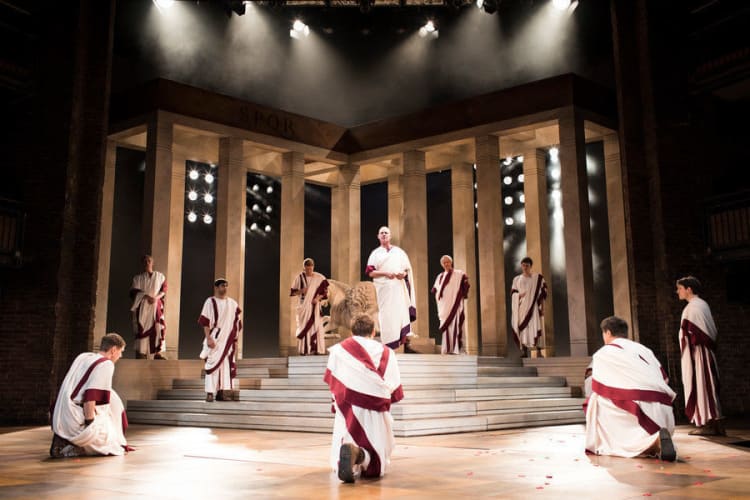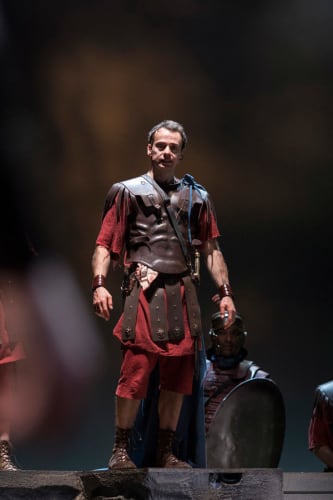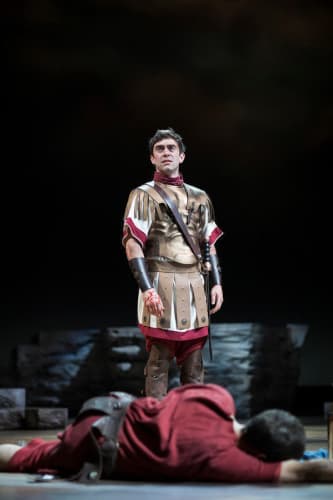This production, directed by Angus Jackson, recounts the story with great clarity and a freshness that makes you forget that it is ancient history and you already know what is going to happen. Its characters wear the togas and armour of ancient Rome but it feels very contemporary. Shakespeare wrote a play about events two millennia ago but he wrote it for his own age and this production resonates with our own time.
There is a hint in Robert Innes Hopkins's set: its pillared portico with its architrave emblazoned with SPQR has square columns and capitals instead of classical ones. Instead of the statue of Pompey below which Caesar was slaughtered, there’s a huge sculpture of a horse being attacked by a lion. However, Shakespeare’s text doesn’t need extra hints of modernity; in Angus Jackson’s production, it is the text itself that seems so present day as assassination is plotted and patrician elite seek to sway public opinion.
It is well spoken, the story clearly told and the characters well established. It's a production that knows how to make the most of a moment, such as leaving the Soothsayer who delivers the Ides of March warning on stage alone afterwards, and punctuates the night scene when Caesar’s assassination is planned with lightning flashes and thunder around the theatre. It makes powerful pictures but there is no gratuitous theatricality but a concentration on the private manoeuvres behind the political situation: the clearest presentation of the play that I can remember.
Andrew Woodall’s Caesar is arrogant, hot-tempered and vain; his threat of an absolute autocracy seems a very real one. There is logic in Cassius’s fears if he gains more power. Martin Hutson presents a Cassius with the “lean and hungry look” Caesar attributes to him, who is a touchy type. He genuinely seems a staunch republican but so used to privilege that he doesn’t recognize his own corruption.
Alex Waldmann is an excellent Brutus. This isn’t a charismatic leader but a man of true honesty, even if he is a bit too self-righteous and used to always getting his own way. There are signs of a growing frustration in Cassius as he gives way to decisions by Brutus that are tactically dangerous.
Mark Antony, stripped to the waist for the race in which we first see him (a race which Jackson turns into a civic ritual), seems a bit of a playboy with a touch of the hedonist he is when older, but he’s cunning. His oration for Caesar’s funeral is no spontaneous outpouring of emotion but carefully calculated as it gradually turns into a satirical attack on the conspirators. When he waves Caesar’s will in the face of the crowd, it's clearly a piece of what now would be “fake news” and he tears it up afterwards.
Octavius Caesar (Jon Tarcy) emerges from being ally of Mark Antony to become a dangerous and vindictive power freak. Demanding death for those who would not support him, we even see him sadistically slitting the throat of Brutus’s innocent boy servant Lucius. His final words about Brutus—“the noblest Roman of them all”—may be true but they are delivered as political posturing. Romans and Elizabethans may not have had modern social media but politicians haven’t changed much.
Julius Caesar plays at the Barbican in repertoire with Antony and Cleopatra and Titus Andronicus as part of the RSC’s Rome MMXVII season.



